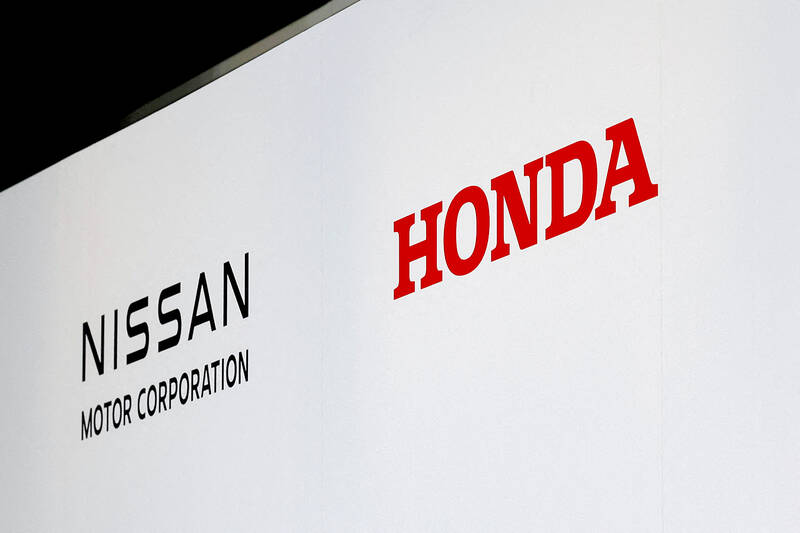Nissan Motor Co shares yesterday rallied after a report said Honda Motor Co would be willing to reopen takeover talks if Nissan CEO Makoto Uchida steps down.
The Japanese auto giants last week said they had scrapped plans to join forces, which had been seen as a way to catch up with US titan Tesla Inc and Chinese firms in electric vehicles.
The merger talks apparently unraveled after Honda proposed to make its struggling rival a subsidiary instead of a plan announced in December last year to integrate under a new holding company.

Photo: Reuters
Uchida told reporters on Thursday last week that “we could not accept this proposal as we were not sure how much our autonomy would be kept and if Nissan’s potential would be maximized.”
However, Nissan shares yesterday rose almost 6 percent at one point after the Financial Times said Honda would be prepared to revive negotiations under a different Nissan boss. The gains were pared to close up 3.7 percent.
The Financial Times, citing people close to the matter, said 58-year-old Uchida had been a strong advocate for a deal.
However, his relations with Honda president Toshihiro Mibe had “deteriorated as Honda became frustrated with the speed of Nissan’s restructuring and the depth of its financial troubles,” the paper said.
Both Honda and Nissan declined to comment on the report.
Nissan announced thousands of job cuts last year after reporting a 93 percent plunge in first-half net profit, and on Thursday said it expected an annual loss of more than US$500 million.
The Financial Times said Uchida faced pressure to depart from board members over the failed talks, although he had indicated a desire to stay in the top job until next year.
Mibe on Thursday said that the automakers would continue to seek “synergy” through a strategic partnership announced in August that also included Nissan’s junior partner Mitsubishi Motors Corp.

SMART MANUFACTURING: The company aims to have its production close to the market end, but attracting investment is still a challenge, the firm’s president said Delta Electronics Inc (台達電) yesterday said its long-term global production plan would stay unchanged amid geopolitical and tariff policy uncertainties, citing its diversified global deployment. With operations in Taiwan, Thailand, China, India, Europe and the US, Delta follows a “produce at the market end” strategy and bases its production on customer demand, with major site plans unchanged, Delta president Simon Chang (張訓海) said on the sidelines of a company event yesterday. Thailand would remain Delta’s second headquarters, as stated in its first-quarter earnings conference, with its plant there adopting a full smart manufacturing system, Chang said. Thailand is the firm’s second-largest overseas

‘REMARKABLE SHOWING’: The economy likely grew 5 percent in the first half of the year, although it would likely taper off significantly, TIER economist Gordon Sun said The Taiwan Institute of Economic Research (TIER) yesterday raised Taiwan’s GDP growth forecast for this year to 3.02 percent, citing robust export-driven expansion in the first half that is likely to give way to a notable slowdown later in the year as the front-loading of global shipments fades. The revised projection marks an upward adjustment of 0.11 percentage points from April’s estimate, driven by a surge in exports and corporate inventory buildup ahead of possible US tariff hikes, TIER economist Gordon Sun (孫明德) told a news conference in Taipei. Taiwan’s economy likely grew more than 5 percent in the first six months

SUPPLY RESILIENCE: The extra expense would be worth it, as the US firm is diversifying chip sourcing to avert disruptions similar to the one during the pandemic, the CEO said Advanced Micro Devices Inc (AMD) chief executive officer Lisa Su (蘇姿丰) on Wednesday said that the chips her company gets from supplier Taiwan Semiconductor Manufacturing Co (TSMC, 台積電) would cost more when they are produced in TSMC’s Arizona facilities. Compared with similar parts from factories in Taiwan, the US chips would be “more than 5 percent, but less than 20 percent” in terms of higher costs, she said at an artificial intelligence (AI) event in Washington. AMD expects its first chips from TSMC’s Arizona facilities by the end of the year, Su said. The extra expense is worth it, because the company is

The seizure of one of the largest known mercury shipments in history, moving from mines in Mexico to illegal Amazon gold mining zones, exposes the wide use of the toxic metal in the rainforest, according to authorities. Peru’s customs agency, SUNAT, found 4 tonnes of illegal mercury in Lima’s port district of Callao, according to a report by the non-profit Environmental Investigations Agency (EIA). “This SUNAT intervention has prevented this chemical from having a serious impact on people’s health and the environment, as can be seen in several areas of the country devastated by the illegal use of mercury and illicit activities,”